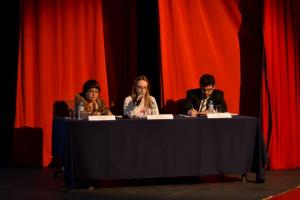In the CONOSUR meetings, participants discuss topics of the international agenda and attend lectures by distinguished experts in Foreign Relations.
On March 26, 2014, one of the panels was dedicated to the topic "Environmental Policies in Latin America". The panel was composed of the State Deputy of Rio de Janeiro, Mrs. Aspásia Camargo, author of the state law on solid waste on the beaches and the Aspásia Camargo Climate Change Law, and Professor João Ricardo Viegas of the University Research Institute of Rio de Janeiro (IUPERJ), which has developed significant research on environmental policies within megacities (C40) and is a member of the technical staff of the Public Prosecutor´s Office of Rio de Janeiro.
The debate was mediated by Karina Marzano Franco, project manager of the Konrad-Adenauer Foundation´s Regional Program for Climate Change, Environment and Energy Security in Latin America.
The discussion began with a reference to the results and proposals of a report issued by the United Nations Environment Programme (UNEP) on "Latin America and the Caribbean on the eve of the Rio +20". According to this report (Global Environment Outlook – GEO5), the main problems faced by the region are 1) limited procedural continuity, due to mandates of short duration; 2) lack of political will; and 3) inadequate instruments to ensure effective law enforcement. Given this scenario, the recommendations for the region are as follows: Governments should take more solid commitment both in relation to new policies and to increasing the effectiveness of the existing ones, ensuring adequate financial resources for their implementation and robust mechanisms of accountability, transparency and inclusion.(To access the report in full, click here).
Some of the important points mentioned in the lectures include the central role played by Latin America, which will host the 20th Conference of Parties to the Convention on Climate Change in 2014 (COP 20 in Lima, Peru). At this conference, a final draft of the replacement agreement to the Kyoto Protocol is expected to be concluded, in order for it to be presented at COP 21 in Paris, in 2015.
It was also pointed out that in multilateral conferences on environmental issues, civil society and the scientific community have played an increasingly prominent role. Specially the role of cities in environmental issues has been emphasized, and so the emergence of important groups such as the C40 Cities - gathering of Mayors of the so-called megacities - and CB27 - forum of Municipal Secretaries of the Environment of the 27 Brazilian capitals.
Some challenges were also discussed, such as a contradictory situation in Brazil, for example. Though Brazil is a country that has a high share of renewables in its energy matrix and a wide availability of sun, wind and water, it is still an importer of renewable energy technology, without taking advantage of its privileged position to develop the domestic industry in this sector. The problem of urban transport was also pointed out, due to the adoption of a priority road model in Latin America.
At the end, the panel was opened to debate, which included valuable contributions from young students of International Relations, who presented their opinion on the subject.
For further information about CONOSUR 2014, click here.







